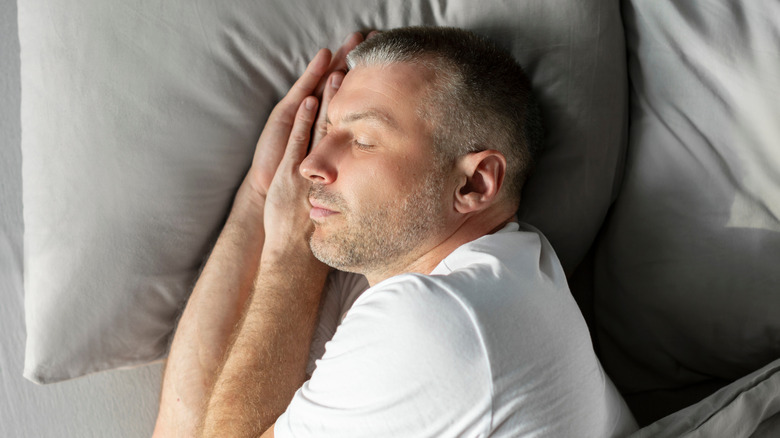This Sleep Disorder Increases Your Risk Of High Blood Pressure
You probably know that you need between 7 and 9 hours of sleep each night, but that vital amount of sleep can be difficult to come by for many people. Whether it's a busy schedule, a crying newborn, or staying up late to binge a series on Netflix, the National Institutes of Health estimates that one-third of people don't get enough sleep. Some people cannot get the recommended amount of sleep due to a sleep disorder.
One of the most common sleep disorders is sleep apnea, where someone stops breathing for at least 10 seconds while asleep. Sleep apnea may show warning signs such as daytime sleepiness, difficulty concentrating, or morning headaches. Aside from losing out on much-needed sleep, sleep apnea may be linked to health conditions such as high blood pressure, Chief Medical Officer of One Oak Medical Group Dr. Jason Singh tells Health Digest.
"Basically what's happening is with sleep apnea you get intermittent hypoxia, which activates the sympathetic nervous system, causing vasoconstriction," he said. "The cycle of oxygen deprivation and restoration damages blood vessels. This then promotes water retention and vasoconstriction, leading to hypertension."
What is sleep apnea?
Central sleep apnea occurs when your brain doesn't signal for you to breathe while sleeping, and the more common obstructive sleep apnea occurs when something blocks your breathing. When you sleep, the muscles in your throat relax, which could cause your tongue to block the airway. You may snore, especially if you sleep on your back.
According to the Sleep Foundation, obstructive sleep apnea is linked to high blood pressure. Half of people with sleep apnea also have high blood pressure, and up to 40% of people with high blood pressure also have sleep apnea. Most people experience a drop in blood pressure during sleep, but people with sleep apnea may experience temporary spikes in blood pressure when they stop breathing. Sleep deprivation as a result of sleep apnea may also keep the body's stress levels and blood pressure elevated.
People with obesity have twice the risk for sleep apnea because fat can accumulate in the upper airway and make it more prone to collapse, according to a 2010 article in Chest. Fat around the trunk of the body reduces flexibility in the chest and decreases lung capacity. Changes in hormone levels, a family history of sleep apnea, or large features in your upper airway can also increase your risk of sleep apnea. Because alcohol can relax your muscles, it may worsen sleep apnea. Sleep apnea is also more common in men and older adults.
Preventing and treating sleep apnea
Sleep apnea isn't just linked to high blood pressure. Losing oxygen for those few seconds while you sleep can also lead to heart disease, stroke, type 2 diabetes, and depression. These also can be risk factors for sleep apnea. You may suspect sleep apnea if you have any of the symptoms or risk factors. Your partner may be able to hear you snoring or short pauses of your breathing, but you may also have sleep apnea if you wake up gasping for breath.
Diagnosing sleep apnea may involve a sleep study and a sleep diary, as well as testing for other medical conditions. "Early diagnosis through a sleep study can lead to treatments that not only improve sleep but may significantly reduce blood pressure and the risk of serious cardiovascular complications," Singh said.
Treating sleep apnea may include lifestyle changes such as regular physical activity, good sleep hygiene, and losing weight. The Sleep Foundation says losing 10 to 15% of your weight can reduce the severity of sleep apnea by 50%. Zepbound, which is an injectable weight-loss drug, has recently been approved by the Food and Drug Administration to treat sleep apnea in people with obesity. People with sleep apnea may also find relief by using a continuous positive airway pressure (CPAP) machine to ensure the flow of air into the lungs. Oral devices may also prevent any blockages of air while you sleep.



